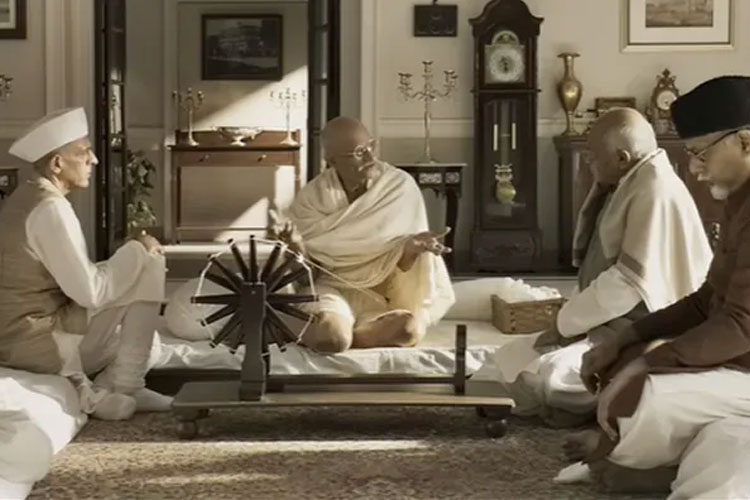
Gandhi Godse: Ek Yudh
Gandhi Godse: Ek Yudh Review - The film is a reductionist, revisionist recreation of the assassination of the Father of the Nation by a Hindu zealot and an imagined aftermath.
The yudh in the title of the film, writer-director Rajkumar Santoshi's first venture in a decade, refers as much to a bitter tussle between the two sharply divergent ideologies that Mahatma Gandhi and Nathuram Godse represent as it does to a war to uphold the truth in a fact-free world overrun by divisive forces.
Barring Pandit Jawaharlal Nehru, no leader of India's freedom struggle is subjected to abhorrent myths and sought to be discredited as much as Mohandas Karamchand Gandhi is. Gandhi Godse: At first flush, Ek Yudh looks like an honest attempt to clear the air.
The film is a reductionist, revisionist recreation of the assassination of the Father of the Nation by a Hindu zealot and an imagined aftermath. In trying to get its point across, it does a balancing act that appears to negate the gravity of the crime.
A period drama not only alters history to facilitate a face-to-face debate between Gandhi and Godse, but also ill-advisedly seeks to draw a parallel between a leader who stood up to the might of the British empire and mobilised an entire nation to fight for freedom and a man driven by hate and bigotry.
Gandhi Godse: Ek Yudh means well overall but does not fare particularly well in imagining of what the Mahatma would have said to, and done with, Godse had he not succumbed to the bullets the latter fired on January 30, 1948. Quickly getting the assassination out of the way, the film veers away from history and into the domain of fiction.
Gandhi's battle to create the nation of his dream continues. He fights the ideas of a man blinded by contempt for him and his pluralistic views as well as the political compulsions of the men who run free India's first government, led by Nehru (Pawan Chopra).
If Gandhi Godse: Ek Yudh feels a touch theatrical, there is good reason for it. It is based on a play by Hindi writer Asghar Wajahat, who has also penned the film's often pointed dialogues. The film would have been a stronger takedown of the false anti-Gandhi narrative that enjoys currency in certain quarters had it not been riddled with contradictions to the extent that it is.
The screenwriter, Rajkumar Santoshi himself, isn't always sure what it is exactly that he wants the film to convey. Although it is generally clear on which side he is, he adopts a rather lenient and vacillating approach to fleshing out the character of Godse, played in a starkly stagey manner by Chinmay Mandlekar.
The script gives Godse a rather long rope. It not only lets him air his questionable views on what the newly independent India should be - Gandhi, essayed with impressive conviction by Deepak Antani, avers that his 'assassin' has every right to speak his mind - but also willingly bestowing on his arguments a semblance of legitimacy and logic.
That said, Rajkumar Santoshi's screenplay does have a sprinkling of truth that, taken in isolation as well as in the context of what is going on in today's India, is significant. In one scene, Bhimrao Ambedkar (Mukund Pathak), who underscores the need for equality and inclusion, asserts that the Constitution and not a religious book should guide the nation as it forges a future for its people.
